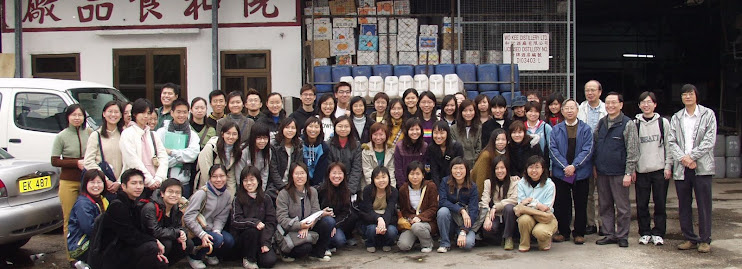Resources for Microbiology. This blog provides resources for the course FNSC3180/4180 Food Microbiology of CUHK. Check this blog often to see what is new. Your comments are welcome. From May, 2011 onwards, news, analyses, and investigation of foodborne microbial diseases are regularly posted in this blog. Analyses of foodborne microbial genomes from Kwan Lab are also posted here.

FNSC4180 |
 Food Factory Field Trip Old Picture |
Total Pageviews
Pages
- Home
- Course Schedule 201819
- Poster special topics groupings 2018-19
- Calendar
- Posters 2016-17
- KwanLab Food Microbiology Glossary Beta Version
- Food Safety Information Database for Greater China--Published!!
- Greater China Food Safety Database 大中华食品安全信息库
- KwanLab
- Foodborne outbreak database
- Useful Food Safety Websites
Monday, March 27, 2017
Food Alert - A batch of vegetable soup suspected to be tainted with chemical contamination 食物警報 - 一批預先包裝菜湯疑受化學物污染
We have issued a food alert regarding "A batch of vegetable soup suspected to be tainted with chemical contamination".
Please check the following link for further details.
http://www.cfs.gov.hk/cgi-bin/cfsnew/fa/foodalert_e.pl?record=174
For further enquiries, you may contact us at <rc@fehd.gov.hk>.
Should you wish to cancel your registration with E-news, please notify us either by email (same address as above) or by fax (no. 2893 3547).
Centre for Food Safety
***********************************************************
各位先生/女士:
我們剛發出關於"一批預先包裝菜湯疑受化學物污染"的食物警報。
詳情請參閱以下連結:
http://www.cfs.gov.hk/cgi-bin/cfsnew/fa/foodalert_c.pl?record=174
如有任何查詢,請與我們聯絡(電郵地址:rc@fehd.gov.hk)。
如想取消[食物安全電子信息]的用戶登記,請透過上述電郵地址或傳真號碼 2893 3547 通知我們。
食物安全中心
Thursday, March 16, 2017
E-news on 16.3.2017
致食物安全電子資訊訂閱者:
Dear E-news recipients,
以下資訊已上載到食物安全中心(中心)網站:
News on the Centre for Food Safety (CFS) online:
消費者委員會聯合研究:本地碟頭粉麵飯的鈉含量
Joint Consumer Council Study: Sodium Content in Local Meal-on-One-Plate
中心與消費者委員會合作,測試了部分本地食肆中較常見的碟頭粉麵飯的鈉含量,並檢視了數個預先包裝碟頭粉麵飯的營養標籤資料,以檢測及比較本地一些碟頭粉麵飯在不同食肆或商店的鈉含量,從而幫助公眾在外出用膳時能作出知情和適合個人情況的選擇,以及推動食物業界透過改良食品配方提供減鈉的碟頭粉麵飯。
The CFS and the Consumer Council have conducted a joint study, and tested the sodium content in some meal-on-one-plate (MOOP) that are commonly available in local restaurants, as well as checked the nutrition labelling information of some of these prepackaged MOOP. This study aims to measure and compare among food outlets the levels of sodium in some local MOOP dishes; inform and assist the public to make informed choices when eating out; and encourage the trade to provide MOOP items with less sodium through recipe reformulation.
詳情請參閱以下網頁:
Please click on this webpage for details:
中文 :
http://www.cfs.gov.hk/tc_chi/programme/programme_rafs/programme_rafs_n_01_22_abstract.html
English:
http://www.cfs.gov.hk/english/programme/programme_rafs/programme_rafs_n_01_22_abstract.html
2017年1月份食物安全報告
Food Safety Report for January 2017
中心會每月公布「食物安全報告」,分享食物監察結果,令市民可適時地獲得最新的食物安全資訊。
As a way to deliver the latest food safety information timely to the public, the CFS announces the "Food Safety Report" every month, sharing the food surveillance results.
有關之新聞公報可瀏覽以下網頁 :
Please click on this webpage for the related press release:
中文 :
http://www.cfs.gov.hk/tc_chi/press/20170228_0789.html
English:
http://www.cfs.gov.hk/english/press/20170228_0789.html
2017年1月份預先包裝食物之營養素含量及致敏物檢測結果
Results of Compliance Test for Nutrition Labelling and Declaration of Allergens for January 2017
為確保預先包裝食品符合《食物及藥物(成分組合及標籤)規例》,中心自2012年起,一直有抽取預先包裝食物的樣本作檢測,其中包括檢測營養素含量及致敏物。2017年1月份有關營養素含量及致敏物檢測結果的報告,已上載到中心網頁。
The CFS has been testing, among other things, nutrients and allergens in prepackaged food samples for compliance under the Food and Drugs (Composition and Labelling) Regulations since 2012. Monthly Report on Results of Compliance Test for Nutrition Labelling and Declaration of Allergens under the Regulations for January 2017 has been uploaded onto the CFS website.
詳情請參閱以下網頁:
Please click on this webpage for details:
中文 :
http://www.cfs.gov.hk/tc_chi/whatsnew/whatsnew_act/NL_Compliance_Test_Results_JAN_2017.html
English:
http://www.cfs.gov.hk/english/whatsnew/whatsnew_act/NL_Compliance_Test_Results_JAN_2017.html
食物安全中心
Centre for Food Safety
Monday, March 13, 2017
Guidelines for poster preparation and submission
Food Alert - A batch of prepackaged salad products which might be contaminated with Listeria monocytogenes 食物警報 - 一批可能受李斯特菌污染的預先包裝沙律
We have issued a food alert regarding "A batch of prepackaged salad products which might be contaminated with Listeria monocytogenes".
Please check the following link for further details.
http://www.cfs.gov.hk/cgi-bin/cfsnew/fa/foodalert_e.pl?record=173
For further enquiries, you may contact us at <rc@fehd.gov.hk>.
Should you wish to cancel your registration with E-news, please notify us either by email (same address as above) or by fax (no. 2893 3547).
Centre for Food Safety
***********************************************************
各位先生/女士:
我們剛發出關於"一批可能受李斯特菌污染的預先包裝沙律"的食物警報。
詳情請參閱以下連結:
http://www.cfs.gov.hk/cgi-bin/cfsnew/fa/foodalert_c.pl?record=173
如有任何查詢,請與我們聯絡(電郵地址:rc@fehd.gov.hk)。
如想取消[食物安全電子信息]的用戶登記,請透過上述電郵地址或傳真號碼 2893 3547 通知我們。
食物安全中心
Wednesday, March 8, 2017
Food Alert - Undeclared allergen (egg) found in prepackaged spaghetti bolognese 食物警報 - 預先包裝蕃茄牛肉意大利麵含未有標示致敏物(蛋類)
We have issued a food alert regarding "Undeclared allergen (egg) found in prepackaged spaghetti bolognese".
Please check the following link for further details.
http://www.cfs.gov.hk/cgi-bin/cfsnew/fa/foodalert_e.pl?record=172
For further enquiries, you may contact us at <rc@fehd.gov.hk>.
Should you wish to cancel your registration with E-news, please notify us either by email (same address as above) or by fax (no. 2893 3547).
Centre for Food Safety
***********************************************************
各位先生/女士:
我們剛發出關於"預先包裝蕃茄牛肉意大利麵含未有標示致敏物(蛋類)"的食物警報。
詳情請參閱以下連結:
http://www.cfs.gov.hk/cgi-bin/cfsnew/fa/foodalert_c.pl?record=172
如有任何查詢,請與我們聯絡(電郵地址:rc@fehd.gov.hk)。
如想取消[食物安全電子信息]的用戶登記,請透過上述電郵地址或傳真號碼 2893 3547 通知我們。
食物安全中心
Tuesday, March 7, 2017
Final Examination is now Centralized and still Open Book
Thursday, March 2, 2017
E-news - 02.03.2017
致食物安全電子資訊訂閱者:
Dear E-news recipients,
以下資訊已上載到食物安全中心(中心)網站:
News on the Centre for Food Safety (CFS) online:
食物安全焦點 (2017年2月第127期)
Food Safety Focus (127th Issue, February 2017)
今期熱門焦點包括 :
The topics of the current issue are:
• 懷疑"假米"的真偽
• The Authenticity of Alleged "Fake" Rice
• 蔬果的除害劑殘餘(第I部分):過去三十年有關除害劑殘餘的食物中毒風險趨勢
• Pesticide Residues in Vegetables and Fruits Part I:Trends in Pesticide Residues Food Poisoning Risk in the Past Three Decades
• 一些產自法國、愛爾蘭及蘇格蘭的生蠔受諾如病毒污染
• Certain Raw Oysters from France, Ireland and Scotland Contaminated with Norovirus
• 一批本地活豬被檢出含有氯霉素
• Chloramphenicol Found in a Batch of Local Live Pigs
歡迎到以下網頁閱覽上述月刊 :
You are most welcome to browse through the publication at:
中文 :
http://www.cfs.gov.hk/tc_chi/multimedia/multimedia_pub/multimedia_pub_fsf.html
English:
http://www.cfs.gov.hk/english/multimedia/multimedia_pub/multimedia_pub_fsf.html
已獲小量豁免產品名單
List of Small Volume Exemption Products
根據小量豁免制度,在香港每年銷售量不超過30,000件的相同版本預先包裝食物,可獲授予營養標籤豁免。有關豁免產品名單已上載至中心網頁。
Under the Small Volume Exemption (SVE) Scheme, prepackaged foods of the same version with annual sales volume in Hong Kong not exceeding 30,000 units may be granted with exemption from providing nutrition labelling. List of SVE products has been uploaded onto the CFS website.
詳情請參閱以下網頁:
Please click on this webpage for details:
中文:
http://www.cfs.gov.hk/tc_chi/programme/programme_nifl/files/SVE_exempted_product_c.pdf
English:
http://www.cfs.gov.hk/english/programme/programme_nifl/files/SVE_exempted_product_e.pdf
食物安全巡迴展覽
Roving Exhibition on Food Safety
3月的巡迴展覽內容包括食物含丙烯酰胺、孕婦食物安全建議、食物安全條例、食物安全5要點、殘餘獸藥、反式脂肪、預防食物交叉污染、有機食物、控制食物溫度、天然毒素及營養標籤。展覽將設於保安道街市、聯和墟街市、西營盤街市、黃泥涌街市、利東邨及電氣道街市。
The coming exhibitions will be held in March at Po On Street Market, Luen Wo Hui Market, Sai Ying Pun Market, Wong Nai Chung Market, Lei Tung Estate and Electric Road Market. Panels cover topics on acrylamide, food safety advice for pregnant women, Food Safety Ordinance, 5 keys to food safety, veterinary drug residues, trans fats, prevention of cross-contamination, organic food, control of food temperature, natural toxins and nutrition labelling.
請點擊查看具體時間:
Please click to see the schedule:
中文:
http://www.cfs.gov.hk/tc_chi/whatsnew/whatsnew_act/whatsnew_act_Roving_Exhibition_2017.html
English:
http://www.cfs.gov.hk/english/whatsnew/whatsnew_act/whatsnew_act_Roving_Exhibition_2017.html
食物安全中心
Centre for Food Safety
